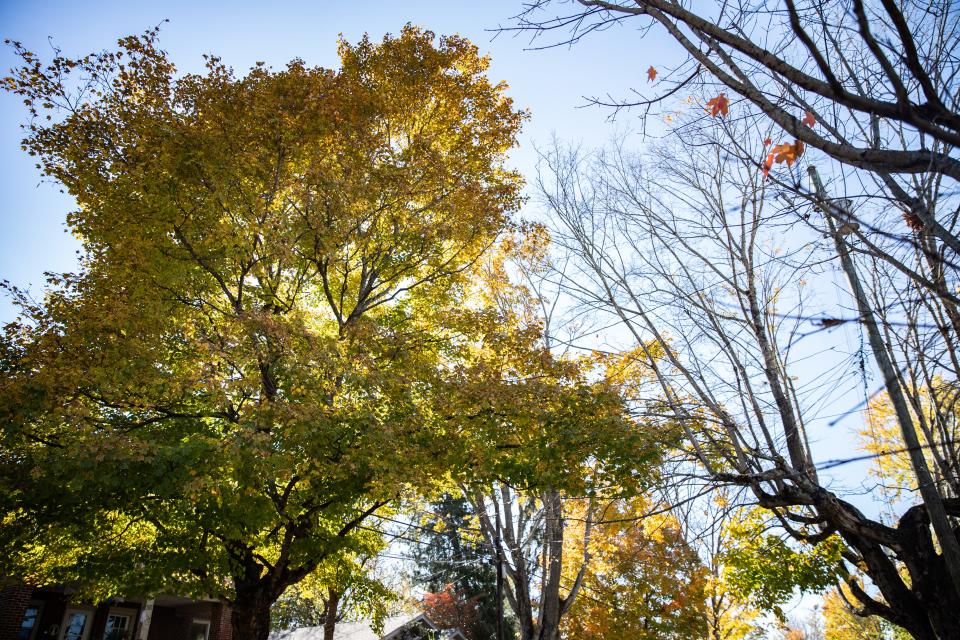Asheville answers call of reparations, urban forestry commissions; living wage proposed
ASHEVILLE — Among a number of additions to its proposed budget, the city of Asheville answered the call of the historic, newly-formed Community Reparations Commission by including a $135,000 increase to its reparations budget and a plan to continue allocation of at least $500,000 annually in coming years.
These additions came in the wake of the reparations commission's first official recommendation May 23, which called for reparations funding to be included in both the city and county budgets in perpetuity in an effort to pay back Black residents for centuries of historic wrongs.
A $365,000 increase to the reparations budget was already included in the proposed $216.9 million fiscal year 2023 budget presented by City Manager Debra Campbell on May 24, and the addition of the $135,00 was included in a June 14 update.

Asheville City Council will vote on budget adoption June 28.
Previous coverage: Asheville proposes $216.9M budget; includes increase to $17/hr minimum wage for employees
Jones Park: After demo, rebuild of Jones Park playground caught in game of 'political football'
Also among the city's budgetary additions was $108,000 for the long sought-after position of a city urban forester, which the Urban Forestry Commission has requested from council for at least five years, according to Chair Amy Smith.
“Personally, I’m just super grateful to City Council for listening and being a part of the conversation and putting our communities and neighborhoods as a priority,” Smith said of the inclusion of the position in the budget.
This sentiment was echoed by several speakers at City Council's June 14 budget public hearing. This budget item had among the greatest showing of support that evening, with about a dozen people turning out.
Among the speakers was Dawn Chávez, executive director of Asheville GreenWorks and a member of the Urban Forestry Commission.
"Having an urban forester on staff at the city is essential to improving and maintaining a healthy urban forest in Asheville and for achieving the goals laid out in the Living Asheville comprehensive plan," she said.

Chávez outlined some of the harm that has befallen the city's tree canopy in recent years — like the loss of nearly 900 acres between 2008-2018 — and the consequence of losing swaths of the city's urban forest.
Among these consequences, she said, is significantly higher carbon emissions, loss of stormwater control, and spiking land surface temperatures.
Hot?: Asheville breaks heat record June 13. NWS says more record heat could come
New living wage: $17.70 for Asheville, Buncombe County, Just Economics says
"Having the urban forester position included in the city's proposed budget is the result of years of work by all the members, past and present, of the Urban Forestry Commission and GreenWorks Tree Protection Taskforce."
According to the city's staff report and Chávez's comments, the position of urban forester would enhance staff capacity and professional expertise to implement the Tree Canopy Protection Ordinance, disburse fee-in-lieu funds, provide cross-departmental coordination and effectively engage community partners.
The $108,000 allocated includes both employee salary and start-up funds for the position.
Budget proposal includes a living wage
The previous iteration of the proposed budget included $5.9 million for an increase from $15 an hour minimum salary to $17 an hour, with all other staff hired before this year to receive a 5% pay increase.
At its May 24 meeting, City Council voiced concerns that the suggested salary increase does not meet the area's recommended living wage of $17.70 an hour.
Among the additions proposed June 14 was $300,000 to bring the city's minimum annual full-time salary to $36,816, or $17.70 an hour, and make associated compression adjustments.
While the original compensation increases would be implemented July 1, the adjustment to a $17.70 minimum wage would not go into effect until January 2023.
Finance Director Tony McDowell said the increase to a $17.70 minimum wage aligned with staff and council desire to fund employee compensation adjustments that reflected inflation in the labor market and local cost of living increases.
Both the compensation adjustments and the addition of the urban forester position, totaling $408,000, are recommended to come out of the city's American Rescue Plan Act money, a pool of federal COVID-19 relief funds.
As city staff continues to pull funding from its $26.2 million ARPA allocation, only $1.7 million remains to be allocated.
The $135,000 increase to reparations base funding was funded by adjustments to five minor general fund revenues.
In other news: Long-awaited projects underway in Asheville neighborhoods; more to come with 2nd phase
Read this: Micro-housing coming to Asheville's South Slope seeks city subsidy; are they affordable?
According to McDowell, in future fiscal years, staff will plan on budgeting reparations similar to annual funding for the Housing Trust Fund, also $500,000, and noted that its inclusion in future budgets is subject to financial feasibility and budget approval by City Council.
Though the reparations commission also called for funding in perpetuity from Buncombe County Commissioners, county spokesperson Kassi Day said the $2 million included in the proposed county budget for reparations is the only amount currently allocated.
Sarah Honosky is the city government reporter for the Asheville Citizen Times, part of the USA TODAY Network. News Tips? Email shonosky@citizentimes.com or message on Twitter at @slhonosky.
This article originally appeared on Asheville Citizen Times: Asheville Reparations could see $500K in annual funding

